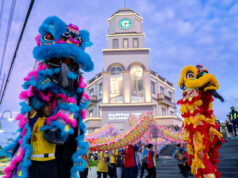The ceremony in this city led by Mayor Edgardo Pamintuan was held at the Museo ning Angeles in Barangay Sto. Cristo.
In San Fernando, Vice Mayor Jimmy T. Lazatin and Rep. Oscar S. Rodriguez (3rd district, Pampanga) led the rites held at the foot of the statue of Abad Santos at the Heroes Hall.
Pamintuan said it is important to remember the martyrdom of Abad Santos, who was a true son of Pampanga, to instil in the youth his heroism.
“Let us remember him not only today, not only every 7th of May, but all throughout,” he added.
Abad Santos was born in the City of San Fernando. He is remembered as one of the greatest “cabalens” who ever lived and laid his life for his country, said Pamintuan.
Joining Vice Mayor Lazatin and Rodriguez in San Fernando were City Councilor Angie Hizon and the City Tourism and Investments promotions Office headed by Ching Pangilinan and other government officials.
Lazatin extolled the martyrdom of Abad Santos who gave up his life for his country.
In Angeles, Pamintuan enjoined Angelenos and said Abad Santos should be placed “in the brightest part of the altar of our memory, and let his memory inspire us to be unbowed and unbending against tyranny, against oppression, against foreign domination, against exploitation, against human rights violations, against corruption, against all that ails our society and country…”
After his speech, the mayor, together with Regional Trial Court Executive Judge Omar T. Viola, Department of Education Division Superintendent Dr. Nicolas Capulong, Angeles City police director Senior Supt. Eden Ugale and other government officials proceeded with the wreath laying ceremony, which was accompanied with a 21 gun salute by the local police.
Abad Santos was the fifth Chief Justice of the Supreme Court of the Philippines and served as Acting President of the Philippines during World War II.
On April 11, 1942, he and his son José Jr. were captured by the Japanese.
He identified himself as the chief justice of the Supreme Court of the Philippines. Abad Santos and his son were taken to a concentration camp.
When asked to cooperate with the Japanese, he refused. Although he had nothing to do with military operations, they imputed to him the destruction of the bridges and other public works in Cebu.
Before he was executed, he told his son, “Do not cry, Pepito, show to these people that you are brave. It is an honor to die for one’s country. Not everybody has that chance.”




